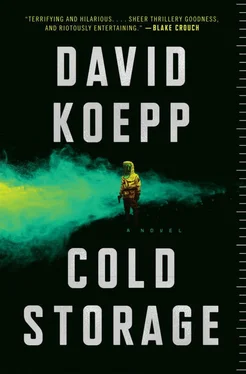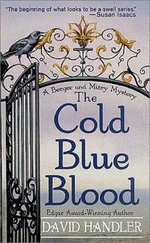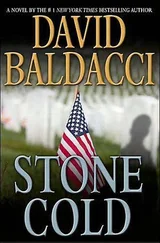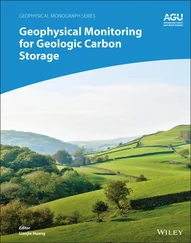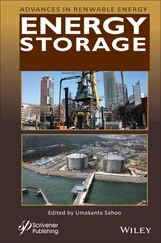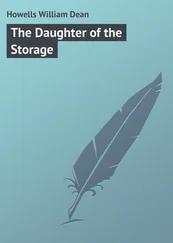They reached the minivan and threw him into the back, producing more screams. Teacake jumped in beside him, Naomi slid behind the wheel, and she started the engine.
Teacake shouted at Roberto, “You started the timer on us!”
“I knew you could get out.”
“You did not know that!”
“But you did.”
“But you didn’t know !”
“But you did.”
Naomi dropped the van in reverse, threw her arm over the seat, and floored it, backing up at top speed. “Guys, shut up.” She reached the top of the driveway, spun the wheel, and the minivan slid around, almost knocking Roberto and Teacake out the still-open side door. “How much time do we have?” she asked Roberto.
He turned his head, painfully, and looked at the timer that he’d set on his watch when he first activated the device. It was at –1:07 and counting. “It should have gone off a minute ago.”
Naomi dropped the van in drive and they took off, down White Clay Road and toward the highway. For a moment, nobody spoke.
Finally, Naomi did. “Well. The timer is unstable. You said.”
“Yep,” Roberto replied.
They drove. Still nothing. No bright light, no tremors in the earth, no fire and brimstone. Nothing.
“How will we know if it goes off?” Teacake asked.
“You’ll know,” Roberto said. He looked at his watch again: –1:49.
Naomi drove, fast. They rode in silence, waiting.
Every second seemed to take forever, and Teacake’s vivid imagination went to work. He had time to imagine three possible scenarios, each more vivid than the last. In the first scenario, the T-41 failed to detonate. The pipes in the basement buckled under Cordyceps novus ’s assault within a few minutes, and the fungus exploded in growth, billowing through the water in the pipes, flowing into the groundwater and eventually into the Missouri River. Within a matter of days, the powerful waterway would be converted to a carpet of solid green fungal matter, which would spread over the surrounding lands, unchecked and unstoppable, rewriting the rules for life on the planet and bringing about a Sixth Extinction, a mass die-off that this time would include all human and animal life on Earth.
So that one was pretty bad.
In the second scenario, Teacake imagined the blasting caps went off and the device detonated as planned. But a few hundred feet underground wasn’t nearly deep enough for a nuclear explosion, and in this version, he imagined the explosion erupting out of the ground, billowing up into the sky in a massive mushroom cloud just like the ones he’d seen in movies and on TV. The poisonous cloud of radiation would blow eastward on prevailing winds, spreading death and disease over the eastern half of the United States.
Admittedly, this scenario wasn’t as bad as the first one, but it wasn’t a lot of fun either.
The third scenario was Teacake’s favorite, and it was for this that he now prayed to a God he didn’t believe in. In this version, the blasting caps went off, better late than not at all, exploding inward on the metal tubes and beginning the process of nuclear compression. The chain reaction commenced, producing an outpouring of heat somewhere between 50 million and 150 million degrees Fahrenheit. The sub-basement and the layers of rock closest to the backpack would be vaporized instantly, forming a crater into which the entire contents of the storage facility would collapse.
All the unneeded furniture, the contents of homes that would never be reoccupied, the pack-rat hoardings of a thousand unhappy people, the stolen Samsung TVs, Mrs. Rooney’s twenty-seven banker’s boxes filled with her children’s school reports and holiday cards, her forty-two ceramic coffee mugs and pencil jars made at Pottery 4 Fun between 1995 and 2008, her seven nylon duffel bags stuffed with newspapers from major events in world history, and even her vinyl Baywatch pencil case stuffed with $6,500 in cash she was saving for the day the banks crashed For Real—all of it, all the junk in all the sealed boxes in all the lockers, some of their contents long forgotten, all the shit, shit, shit, shit—all of it would melt, collapsing downward into the cavity, forming a rubble chimney that would swell upward.
From ground level, Teacake imagined, a perfectly round crater might emerge, sucking the entire facility and the hillside all around down into it in a matter of seconds, as if it were on some giant round elevator, as if God had pushed the Down button and called everything back inside Mother Earth to be reconfigured, repurposed, used another day for a greater end. The fungus itself would be incinerated, Teacake thought, burned off the face of the planet for good, and as the explosion settled, a harmless cloud of dirt and dust would rise up, all that was left of the Atchison Storage Facility and this fucked-up night.
And in the end, two minutes and twenty-six seconds behind schedule, that was exactly what happened.
The snow globe was back in the cabinet. Roberto had upgraded the emergency cell phone and given it a fresh charge, just in case. Both were locked away in the secret kitchen cupboard again, and on most days, he hoped they’d never come back out. On the other days, the days when he felt particularly proud of himself, he’d muse about how awfully good he was at his job after all and what a shame it would be to park those skills on a shelf forever.
The government attention had been flattering in the immediate aftermath of the Atchison Event, as it was now universally called in the media. In the first hours after the blast, Jerabek had tried hard to play the traitor/terrorist/rogue-agent card, but Roberto was much too skilled a player to be snookered. The initial white paper he’d written on the fungus had been archived in three separate backup locations, to ensure it could never be destroyed without being widely read and, inevitably, leaked to the press. Abigail, whose real name actually was Abigail—huh, guess he didn’t know everything—had proven to be a determined truth-teller and a savvy player of government games. Within twenty-four hours the real story was out, and they were heroes. Talk of renegade Deep State actors gave way quickly to serious conversations about planning for potential future hostile biological invasions and a lively debate about real estate values along the Missouri River bluffs. Speculation ensued.
Roberto sat now on the back porch of the house in North Carolina, in the rocker, the one that felt good on his back. He was nowhere near full strength, but at least the surgery was over with, and he was in the sweet zone of his second Percocet of the day, so pain wasn’t an issue at the moment. He was watching Annie, who was working in the garden. He loved the wide-brimmed hat she wore in the sun, the one she’d bought on the trip to Harbour Island. He loved the blue Wellingtons she stomped around in, the pair she’d bought at the Clarks on Kensington High Street in 2005. He loved the way she stood back after clipping or weeding a particular area, the way she assessed what she’d done and thought about whether it was good enough or needed more. Invariably, she’d see that it needed a little more pruning, a bit of extra shaping, and she’d keep working. He loved watching her form. Her shape was the shape of home to him, and he never tired of admiring her.
Beside him, his cell phone buzzed. He looked at it and smiled, recognizing the number. He picked it up. “You’re still terrible on TV.”
“Like, I know, right?” Teacake replied. “I don’t even know why I do that shit.”
“I do. How much you get?”
Teacake laughed. “Five grand.”
“You’re selling yourself cheap.”
Читать дальше
Конец ознакомительного отрывка
Купить книгу
